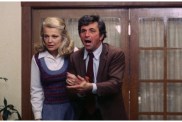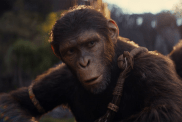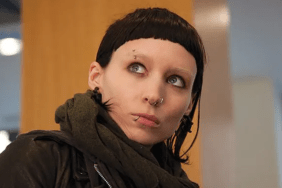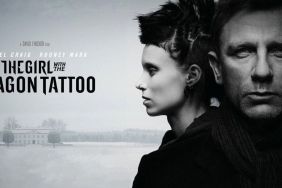Cast:
Daniel Craig as Mikael Blomkvist
Rooney Mara as Lisbeth Salander
Robin Wright as Erika Berger
Stellan Skarsgård as Martin Vanger
Christopher Plummer as Henrik Vanger
Joely Richardson as Anita Vanger
Embeth Davidtz as Annika Blomkvist
Goran Visnjic as Dragan Armansky
Joel Kinnaman as Christer Malm
Elodie Yung as Miriam Wu
Julian Sands as Young Henrik Vanger
Geraldine James as Cecilia Vanger
Steven Berkoff as Dirch Frode
Yorick van Wageningen as Nils Bjurman
Donald Sumpter as Detective Morell
Christopher Maleki as Hanzell
David Dencik as Young Morell
Arly Jover as Liv
Moa Garpendal as Young Harriet Vanger
Ulf Friberg as Hans-Erik Wennerström
Per Myrberg as Harald Vanger
Bengt C.W. Carlsson as Holger Palmgren
Inga Landgré as Isabella Vanger
Henry Hereford as Viggo
Directed by David Fincher
Story:
Millenium magazine publisher and investigative journalist Mikael Blomkvist (Daniel Craig) has left his post under the controversy of a lawsuit, but he’s quickly hired by Henrik Vanger (Christopher Plummer) to look into the mysterious disappearance of his niece Harriet 40 years earlier by investigating his eccentric family, all of whom live on a private island in Northern Sweden. Along the way, Mikael gets assistance from a cyber-investigator named Lisbeth Salander (Rooney Mara), a damaged young woman who has suffered from abuse but the only person shrewd enough to get through the tangled web of lies surrounding the Vanger family.
Analysis:
Anyone who saw the Swedish adaptation of the late Stieg Larsson’s bestselling novel launching his “Millennium Trilogy” may have noticed what a huge influence David Fincher’s “Se7en” must have had both on the author and filmmaker, and been just as surprised when Fincher himself decided to tackle the material.
Remaining just as faithful to the novel as its predecessor, the film has a cold open introducing Christopher Plummer’s Henrik Vanger, the man whose loving relationship with his missing niece leads to an investigation that will lead reporter Mikael Blomkvist to uncovering long dormant secrets and a cold case involving a series of brutal serial killings. Contrary to anti-remake belief, the existence of Fincher’s film takes nothing way from Niels Arden Oplev’s film and Noomi Rapace’s brilliant performance, because this is really about how a visionary like Fincher brings his own look and tone and attitude to Larsson’s material.
This is most apparent with the opening title credits, which are akin to a James Bond title sequence if created for an S & M recruitment video, melting rubber and leather forming shocking images of sex and violence. Driven by a cover of Zeppelin’s “Immigrant Song” by long-time Fincher collaborator Trent Reznor and Karen O. from the Yeah Yeah Yeahs, this sequence is far more fast-paced than almost anything else in the film, but it immediately gets the viewer into the proper mindset for what they’re about to experience.
At its core, “Dragon Tattoo” is a meticulous investigation piece on par with “Zodiac” following Blomkvist’s search for truth while exploring the Vanger family, many whom still live on the island, never speaking to each other. Concurrently, we meet Lisbeth Salander, a cyberpunk hacker of indeterminate age who was assigned to investigate Mikael before he was hired. After the death of her guardian, she must contend with a sleazy lawyer who demands sexual favors from her in order to access her trust fund, a relationship that quickly turns violent when she’s had enough. Eventually, she and Mikael are brought together and during their investigation of the Vangers, they uncover the cold case of murdered women that leads them to discover whether Harriet may have been one of the killer’s victims.
This is another terrific film from Fincher, one which uses suspense and tension better than 95% of the other filmmakers who’ve explored the crime genre, as well as using the Swedish landscape and the isolated island location as something crucial to every aspect of the storytelling. Another key thing Fincher brings to the table is the exemplary ensemble cast he’s assembled to bring Larsson’s characters to life. Here, we have dramatic powerhouses like Robin Wright and Christopher Plummer, Joely Richardson and Stellan Skarsgard in the satellite roles that bring so much more weight to their characters and their scenes with Daniel Craig.
Craig is perfectly suitable as Blomkvist, just as strong as Michael Nyqvist, but he wisely takes a back seat to Rooney Mara whenever she’s on screen. There’s something about Larsson’s character that’s clearly able to tap into something primal in anyone who reads about her, which includes the two brilliant actresses who have now played her on screen. Mara’s Lisbeth Salander is a true force of nature, and there’s something about her portrayal of Lisbeth that makes her feel more vulnerable than Rapace’s version, which makes the scenes when she lashes out even more shocking. Fincher and Mara turn Lisbeth into an extreme badass who will have a significant impact on anyone who sees the movie.
To those who haven’t read the book, the relationship between Lisbeth and Mikael and what she sees in this man so much older than her might be the most puzzling aspect of the film. Does she see him as a father figure or does knowing so much about him through her investigation make him more ideal? This intriguing relationship is a lot more fleshed out in Fincher’s film, both literally and figuratively, with scenes of stark eroticism between Craig and Rooney that enhances this mystery, though some may be put off by how those scenes contrast with the brutality of the sex earlier in the film. As always, Fincher never does anything by halves and this dichotomous use of sex may be the make or break for some viewers. (As much as we hate to harp on the MPAA, the fact “Dragon Tattoo” gets an R-rating while Steve McQueen’s “Shame” gets an NC-17 for showing roughly the same amount of sexuality with nothing nearly as violent, just reinforces our feelings about the current ratings system being a farce.)
We probably won’t have to say too much about the score by Trent Reznor and Atticus Ross, who won an Oscar for their previous collaboration with Fincher on “The Social Network.” If you’re someone who pays heed to film music, you probably already own the score, another perfect synthesis of ambience and bubbling techno rhythms that brings so much to every scene, often in a more subliminal way rather than outright hitting you in the face.
The subject matter will make it a tough movie for some to watch for sure, and we can’t say too much about the last act without spoiling some of the major plot twists that makes the film such a nailbiter. There’s clearly a lot more to explore with Larsson’s characters, which is why it’s so fascinating to see Fincher’s approach to the material.
In fact, our only major criticism and something that does hurt the film is that it’s way too long, even compared to the Swedish adaptation. This is partially due to an epilogue meant to tie up loose ends, but the central story about the missing girl and the serial killings is done so beautifully, the overarching plot of the rich magnate suing Mikael seems less necessary other than to set-up movies based on Larsson’s other two, arguably weaker, books. Fincher goes a little further to make his “Dragon Tattoo” work well as a standalone film and feel less open-ended, and you’ll want to see him tackle the sequels and wondering how far he’d diverge form the books to avoid the pitfalls of the Swedish sequels.
The Bottom Line:
As a filmmaker, David Fincher continues to establish himself as a hero of the outcast and the disenfranchised and with Rooney Mara, he’s established Lisbeth Salander as another unforgettable film character on par with Tyler Durden and Mark Zuckerberg. “Dragon Tattoo” is another piece of brilliant filmmaking by Fincher that along with “Se7en” and “Zodiac” forms the definitive box set exemplifying the perfect crime investigation trilogy.









